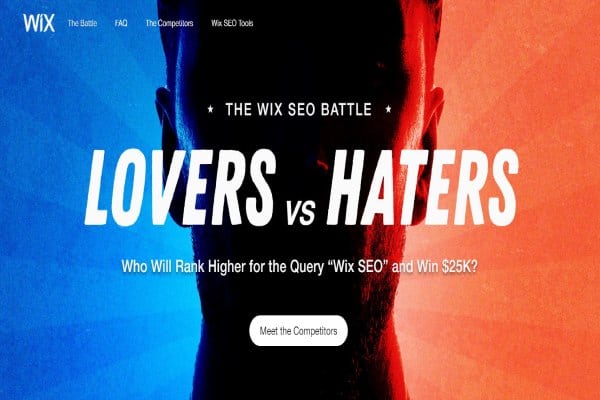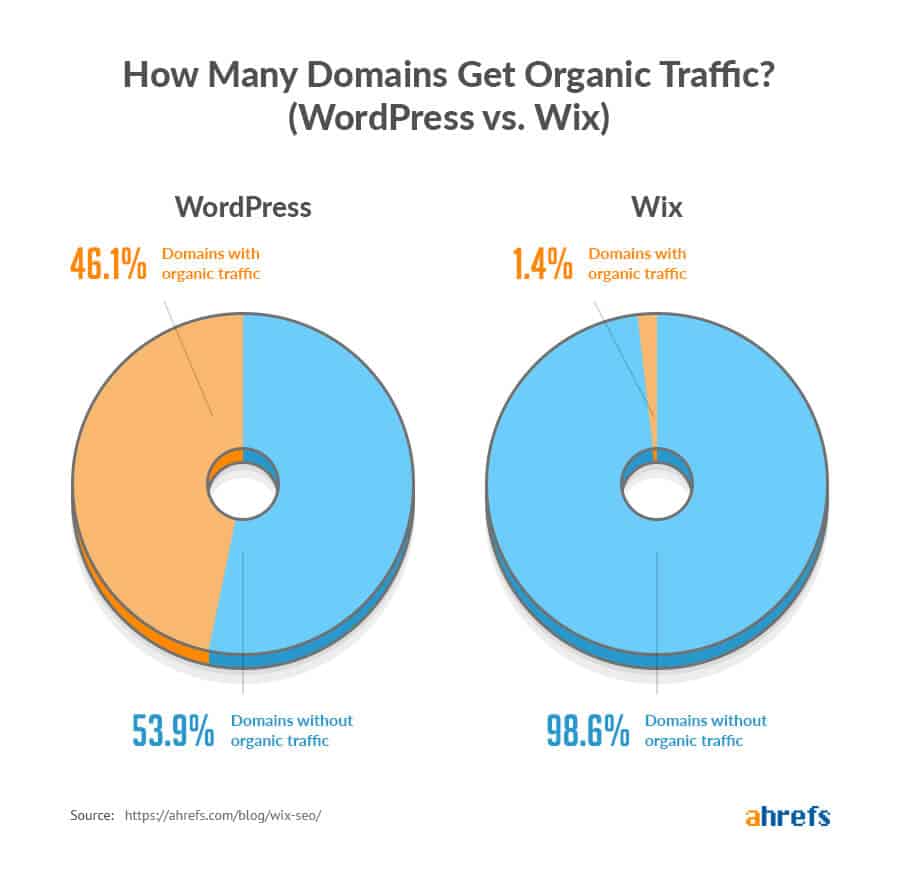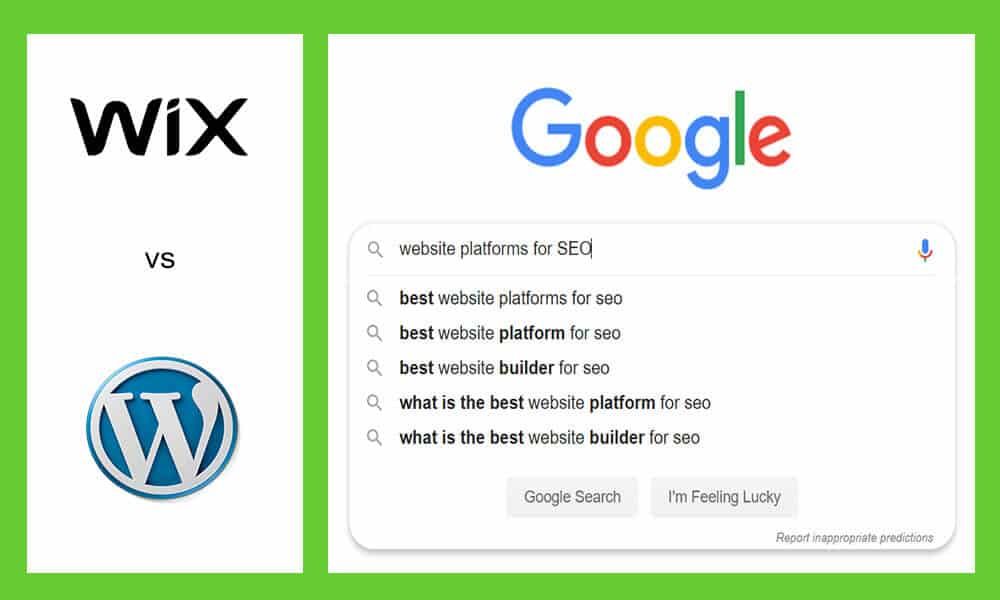Recently I investigated how Wix and WordPress compare for SEO.
Why?
One of my clients wanted to redevelop their website. We put together a brief and sent it to some potential developers. One responded with a proposal based on Wix. Now, my first reaction was that Wix is no good for SEO – but after sleeping on it, I remembered how much things change online. So I decided to look into what the experts thought.
I used online research, which has some risks, but I tried to make it balanced and meaningful. Here’s how I did that.
- I searched for ‘Wix vs. WordPress SEO‘.
- I added the date 2020 to make sure I was looking at recent analysis.
- From the long list of results, I eliminated any company where I could see a potential for bias. (For example, WordPress theme developers would tend to favour WordPress, so I ignored them.)
Here’s my summary of the articles that made the cut.
| What the online community says about SEO using Wix or WordPress |
Scoring |
|
| Wix | WordPress | |
| https://www.websitebuilderexpert.com/website-builders/comparisons/wix-vs-wordpress/ | 0.5 | 0.5 |
| https://www.growthmarketingpro.com/wix-vs-wordpress-seo/ | 0 | 1 |
| 0 | 1 | |
| https://www.websitetooltester.com/en/blog/wix-vs-wordpress/#SEO_Will_I_show_on_search_engines | 0.5 | 0.5 |
| https://www.stylefactoryproductions.com/blog/wordpress-vs-wix | 0 | 1 |
| https://ahrefs.com/blog/wix-seo/ | 0.5 | 0.5 |
| https://hostingcanada.org/wix-vs-wordpress/ | 0 | 1 |
| Subtotal | 1.5 | 5.5 |
It’s a rough and ready score, but online opinion is still strongly in favour of WordPress overall. Having said that, a number of the articles talked about how far Wix had progressed. Enough to make me think again.
The Wix SEO Battle
I also discovered that in 2019 there was a Wix SEO battle. Two agencies tried to rank for the search term Wix SEO. One of them had to be positive about Wix SEO. The other had to be negative.

And amazingly the Wix SEO lovers won.
That made me think again. So I looked deeper into the Wix SEO Battle.
Firstly, the contest was sponsored by Wix. That doesn’t mean Wix controlled the results, but it is a red flag. There’s evidence that medical research trials sponsored by pharmaceutical companies are more likely to find positive results than independently funded ones.
Secondly, I found an explanation by the SEO haters of why they lost. Of course this too is likely to be biased! But I read through it and some of the points they make seem very valid to me. For example
- The relative domain authority of the contestants was such that the SEO lovers started with an advantage.
- The definition of ‘winning’ was overly simple for real life. Who ranks highest for one single term on one single day.
- The Wix SEO haters actually ranked higher than the Wix SEO lovers for most of the six months of the contest.
Finally, and perhaps most interestingly, neither team managed to rank higher than page 4 of Google at any time during the contest. What has page 4 of Google got to do with real life? Even position 4 on the first page only gets a really small proportion of clicks!
Wix vs. WordPress in the real world
So I went back and looked at the detail of those real world expert reviews. And here’s what I found:
A random WordPress site is more likely to get traffic from search than a random Wix site

Ahrefs run millions of search queries every day to determine how different sites and pages rank. They looked at all the domains they track and compared how they perform in search results. You can see the chart shows nearly half of WordPress sites get traffic from search, where for Wix it’s less than 2%.
Wix doesn’t manage images as well as WordPress
Firstly, Wix creates the file name for each image you upload. You have no control.
Why does that matter? The image file name is an opportunity to add keywords or related terms. For pages with lots of images, that means you are missing a lot of SEO opportunities.
Secondly, WordPress has better built-in image size management tools. Uploading an image creates a number of different sizes of the same image, so you can choose an with fewer pixels for small display areas. This loads faster, and speed is good for SEO.
There are also many WordPress plugins which compress files to fewer bytes for faster loading. If you’ve got an image heavy site that’s really important.
Is Wix truly responsive?
A responsive site looks good on all screen sizes from mobile to the biggest desktop display. Some analysis questioned the way that Wix achieves this, saying it is not ‘truly responsive’. We all know Google is big on moible responsiveness. There may be a risk here.
Wix vs WordPress for SEO – should you care?
Once upon a time, I would have said WordPress over Wix every time. Now it’s not so clear.
Wix is certainly capable of delivering SEO results. So if you want to use Wix, go ahead. But if you’re wondering, consider the following questions
1. How important is SEO for your site?
If your site is primarily to support offline networking efforts, then SEO isn’t relevant. If you drive traffic via social media and other digital marketing campaigns, it may not matter much. But if you’re investing in blogging and content marketing, you probably care more about SEO. Every little advantage WordPress can give may matter.
2. Which platform do you know already?
Many people find Wix much easier to learn than WordPress. But what if you know WordPress already? Or if the person who’s supporting you knows WordPress? Switching can be more effort than sticking with what you know.

3. How important are images and mobile usage to your site?
This was the killer question for my client. A restaurant website is used by consumers who are out and about, accessing the internet on mobiles. And it’s full of images of delicious food.
We went with WordPress.
A sincere thank you to the developer who made me look again at Wix and see how far it has come. I’m now far more comfortable with the platform and its capabilities than I ever was before. Even if it was the wrong option in this case, it’s a solid competitor.
And for most websites, problems with content and performance are more of an issue than which platform they use.







